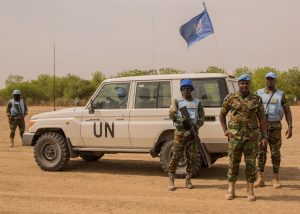
South Sudan has not been easy even for the global leader in conflict management
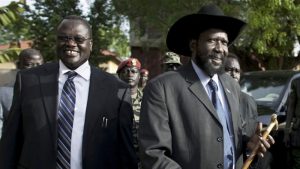
South Sudan leaders – Riek Machar and President Salva Kiir, the legendary strategist in guerrilla warfare
There is still no consensus yet among the major players involved. These are the United Nations, the United States of America, the African Union, (AU), the few global NGOs/think tanks with capacity to ply the international security pitch and perhaps the South Sudanese government. Those who read the September 26th, 2018 story in The Washington Post titled Africa: A new report estimates that more than 380,000 people have died in South Sudan’s civil war must have taken note of this lack of consensus. While the UN’s 2016 estimates was operating at 50, 000, the new report which must have been released by now is talking of 380, 000 dead. They are all talking of how many have been killed – shot to death by troops or fellow civilians or by child soldiers; died of starvation, killed by one outbreak of an epidemic or another – in the multiple of wars in which South Sudan remains engulfed since its birth as an independent nation. The study containing the new figure was funded by the United States Institute of Peace, (USIP) along with the Department of State but conducted by the London School of Hygiene and Tropical Medicine.
The Washington Post itself implied the question of whose shame it is by calling it a “brutal civil war” with figures of death pointing to “horrors of an often-overlooked conflict”. A brutal civil war with figures of death pointing to horrors of an over-looked conflict automatically indicts the United Nations which animates international peace and security. This will appeal to Pan-Africanists and Afro-optimists just as well as those who wonder how the dynamics work out in such a way that neither the UN, the big powers, both the genuine and the fake indigenous leaders, African supranationalism nor INGOs are ever able to pre-empt many preventable large scale violence across the continent. The success stories appear too few. These actors are more successful in humanitarian intervention which their critics have, however, chosen to intellectualise as ‘Humanitarian Imperialism’.
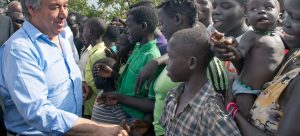
The local and foreign agency problem in managing conflicts in Africa
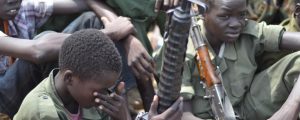
Child soldiers as violence multiplier in wars in Africa but someone groomed them as such
But there is the other side of the question as to whether South Sudan is not interrogating the African agency even more. The question is posed like this: Is it possible that after having been moving from one large scale violence to another since the 15th century, the African continent would seem to have internalised violence beyond cure now? Otherwise, how come that notwithstanding its rich resources for conflict surveillance and resolution, especially through proverbs and idioms, the continent remains trapped in violence. After all, in which African country is some from of violence not on, about to begin or just over? Very few!
Only local and foreign conflict entrepreneurs are permanently powerful to do whatever they want in Africa. And that could range from collapsing any African state they finger to be necessary to collapse, or discredit/blackmail credible elements in the polity or force some others to compromise. It is thus possible for any African country to implode at any time. That is where Cameroon would appear to be heading. Yet, the diplomatic wheel is grinding so slowly behind the scenes while people are dying
Ordinarily, Nigeria would have been the peacemaker, the vicar of humanitarian intervention as opposed to ‘humanitarian imperialism’. But Nigeria itself is at war – containing a nine year old insurgency at great costs to its very fabric. Even without the challenge of a resistant insurgency, the Republic of Cameroon is not the same as the Liberia or Sierra Leone where Nigeria could almost single handedly intervene decades back. It has had a territorial tussle with Nigeria and even the most genuine moves by Nigeria risks being (mis) interpreted from that history. Nigeria seems to have, understandably, refrained from any actions that could be remotely construed as aiding and abetting secessionists.
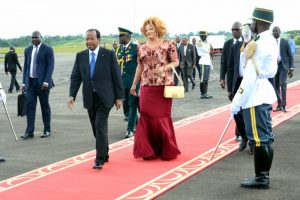
President Paul Biya with Chantal, his wife
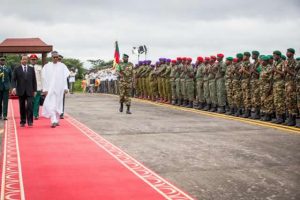
President Buhari of Nigeria and Biya of Cameroon
Yet, the truth is that Cameroon is a nieghbour in the grip of a conflict that could engulf everyone. Syndromatic of the typically hollowed out African state, the Cameroonian State is obviously overwhelmed with managing stability. The option of secession should be out of it in any African country because it doesn’t offer anything worth it in the world ahead. They need to come together rather than break-up into multiplied suffering. But that does not mean African states should not prevent this legacy of mass misery and pain and suffering that advertises the continent as a zone of failure in the organisation of human beings.
That is where the African tragedy lies hidden. Neither Nigeria nor any other African country can afford to intervene in Cameroon but France can easily do whatever it wishes to do at whatever time without having to mind any silly sentiments that Nigeria, for example, must mind. Meanwhile, other than a player such as France, Africa is distant suffering. That is what The Washington Post meant by its reference to an “often-overlooked conflict”.
The tragedy is that African can kill each other but they lack the guts to count and to reveal the true figures. It takes her Others to do the counting and the full disclosure, with all the politics of who is dying and who is counting!
Above all, the question remains: why is there war all over the place across the African continent? Which of the explanations lead anywhere – colonialism and complicated national question, manipulation of ethnicity, bad leadership, imperialist machinations, warlordism, poverty and alienation? When will wars give way to the good life or will the good life never come to this historically troubled continent? If good life would come,who will bring it? The media, INGOs, development partners, the politicians or revolutionaries?




























